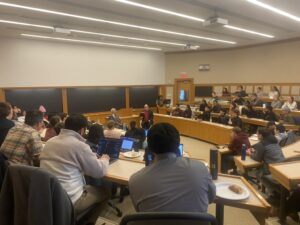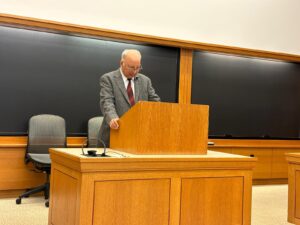A Conversation with Justice Ananda Mohan Bhattarai
By Deepika Singh ’24
On Friday, February 9th, dozens of Harvard Law students packed a lecture hall over lunch to join Justice Ananda Mohan Bhattarai of the Supreme Court of Nepal in a conversation about environmental constitutionalism. The Justice has served on Nepal’s highest court since 2016 and spoke from his depth and breadth of experience in domestic and international law, ranging across multiple jurisdictions and several decades.

Nepal is a jurisdiction grappling with complex environmental and human rights issues. Though the country contributes negligibly to the greenhouses gases that warm our planet, it suffers from immense floods, fires, and cloudbursts that deeply affect Nepali people and the environment. Recent court cases elaborating on environmental obligations across constitutional and international law draw the role of domestic courts to light, as Nepal leads the conversation on the interplay between the climate change and human rights. The initiative to host Justice Bhattarai stemmed from this focus on the nexus between human rights and the environment, the central theme for this year’s Special Edition of the Harvard Human Rights Journal; the Justice’s remarks delivered salient insights into Nepal’s landmark cases that set precedents rippling far beyond her own jurisdiction.
Justice Bhattarai spoke of Nepal’s rich geographic diversity, recent transition into democracy, and bold constitutional rights framework. Drawing upon these topics, clinical Professor Tyler Giannini joined the Justice in moderating a Q & A session for attendees. Professor Giannini himself is a pioneer in environmental human rights, with expansive experience in the field including founding Earth Rights International to hold businesses accountable for environmental abuses. The two scholars engaged in conversation about Nepal, its constitution, and its people:
“For a country in a forced conflict situation with a sensitive physical environment, justice in the widest manifestation and amplitude carries a lot of meaning for the sustainability of the Constitution and that of the nation,” Justice Bhattarai explained. The constitution of Nepal, effectuated in 2015, enshrines numerous environmental rights, including an explicit right to a healthy and clean environment, a right to food security and sovereignty, and protections for people affected by environmental degradation. Animating this rights framework are bedrock constitutional principles such as ecological balance, intergenerational equity, and prior informed consent.
The Justice also spoke of the landmark decision he penned in Sailendra Ambedkar v. Office of Prime Minister et. al., which boldly declared the widespread damage through the excavation of the Churia Hills as ecocide. As Professor Giannini explained, this case sets an example for nations around the world who are currently undergoing intense debate about implementing ecocide as a crime in their own jurisdictions; it remains especially topical as momentum builds towards including ecocide as the fifth crime in the Rome Statute of the International Criminal Court.
Unique about Nepal’s legal system is the ability for citizens to undertake “public interest litigation” petitions, allowing litigation to protect the general public, regardless of whether the party filing suit is affected directly by the alleged grievance—contrast this with standing requirements under U.S. law, which requires that plaintiffs suffer an “injury in fact”. Such petitions have “changed the judicial landscape in Nepal,” explained the Justice, as several constitutionally significant cases have been decided in the last thirty years based on suits brought forth through this mechanism.

When asked how the court balances this power with fears of judicial overreach into public affairs, Justice Bhattarai clarified that the court has the responsibility to hear such cases “not because of any ambition on the part of the judiciary,” but rather because Nepali people have raised their voices on situations compelling to the country and the people. “We are part of the justice process, but there is an obligation on the judiciary to intervene and really work for its people…the judiciary is bound as a guardian of the constitutional system.”
The local, regional, and global perspectives provided by Justice Bhattarai during the event delivered critical insights into burgeoning issues amplified by accelerating climate change, such as resource preservation, wildlife protection, and sustainable development. Nepal’s rise to meet the formidable challenges of a warming planet serve as a blueprint and inspiration for environmental and human rights lawyers and activists across the globe.
The event was jointly hosted by the Harvard Human Rights Journal, the Asia Studies Center, the Lakshmi Mittal and Family South Asia Institute, the Asian and Pacific American Law Students Association, the South Asian Law Students Association, the Environmental Law Review, the Environmental Law Society, and the Harvard Undergraduate Nepali Student Association. This diversity of sponsors, as explained by Ariq Hatibie, the co-Editor-in-Chief of the Harvard Human Rights Journal, reflects the broad range of invaluable experience Justice Ananda Mohan Bhattarai generously shared with the Harvard Law School during the event.
In closing, Justice Bhattarai had just one ask for the students attending his discussion: “I sense that some of you might have already visited Nepal, but I suspect not all of you have visited…My request remains that you come over to Nepal sometime and have a closer look at the Himalayas and our people,” he said with a smile on his face.

Leave a Reply
You must be logged in to post a comment.